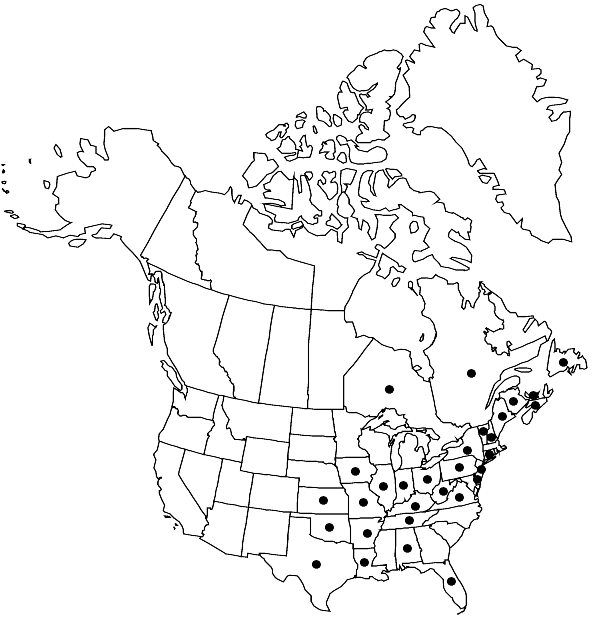Pogonatum pensilvanicum
Mém. Soc. Linn. Paris 1: 461. 1823,.
Plants small, dull and brownish, scattered on a bright green protonema. Stems 0.2–0.6 cm. Leaves 2–4 mm, when dry loosely sheathing at the base, the blade narrow, curved and often hooked at the tips, erect-spreading and almost straight when moist; sheath oblong to oblong-ovate, in leaves near the base of the shoot abruptly contracted to the blade, in distal leaves more gradually tapering, not hyaline-margined, with a narrow strip of incrassate cells at the shoulders; blade narrowly lanceolate to linear, slenderly acuminate, ending in a short point; marginal lamina ± plane, variable in width, 1-stratose, irregularly notched-dentate or at times almost entire; costa smooth or weakly toothed abaxially near the tip; lamellae 11–16, entire in profile, 4–8 cells high, the marginal cells larger and rounded in section, single or in pairs, smooth; sheath cells short-rectangular; cells of lamina 10–12 µm, subquadrate to irregular. Seta 1–3.5 cm, reddish. Capsule 2.5–4 mm, erect or nearly so, sometimes indistinctly angled; exothecium scabrous, the cells short-rectangular, thick-walled; operculum obliquely rostrate; peristome 190–220 µm, divided to 0.8. Spores 9–12 µm.
Habitat: Pioneer on steep banks of moist clay or silt
Elevation: low to moderate elevations
Distribution

N.B., Nfld. and Labr. (Nfld.), N.S., Ont., P.E.I., Que., Ala., Ark., Conn., Del., Ill., Ind., Iowa, Fla., Kans., Ky., La., Maine, Mo., N.H., N.J., N.Y., Ohio, Okla., Pa., Tenn., Tex., Vt., Va., W.Va., Mexico, West Indies.
Discussion
Pogonatum pensilvanicum is widespread in eastern North America. It differs from P. brachyphyllum by the more slender, membranous leaves with irregularly dentate margins and fewer lamellae. The marginal cells of the lamellae are typically in pairs, and they may “bulge out and proliferate, giving rise to masses of what apparently are gemmae” (G. E. Nichols 1937). The calyptra is dirty white and stands out in contrast to the bright emerald-green protonema. When taken up, the texture of the protonemal mat is firm and often quite rubbery. Specimens with more regularly dentate leaf margins are sometimes distinguished as var. torreyanum (Bridel) Paris. Pogonatum pensilvanicum has been reported from South America.
Selected References
None.